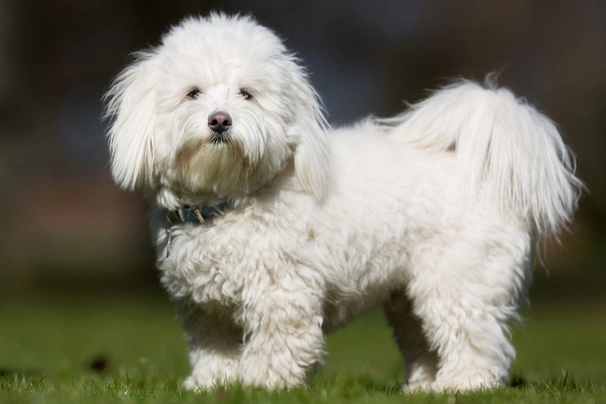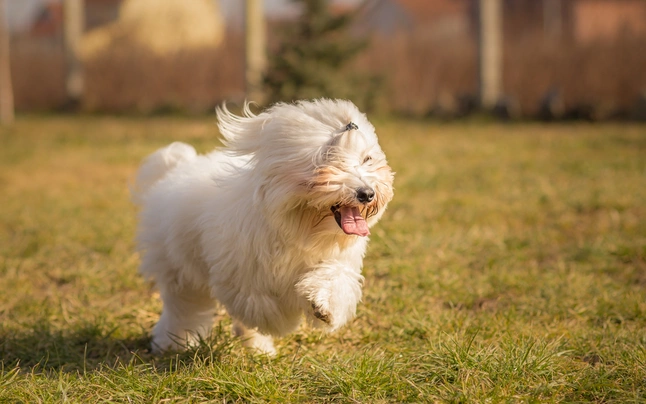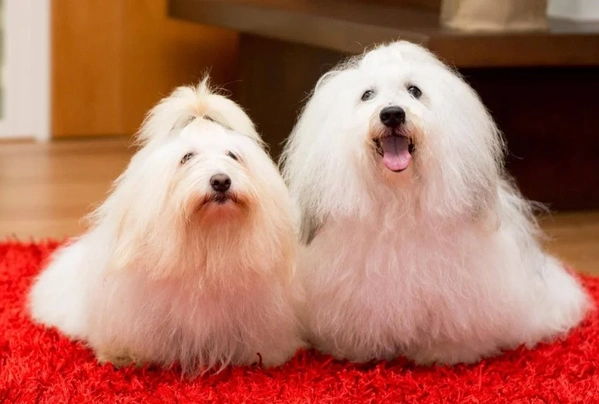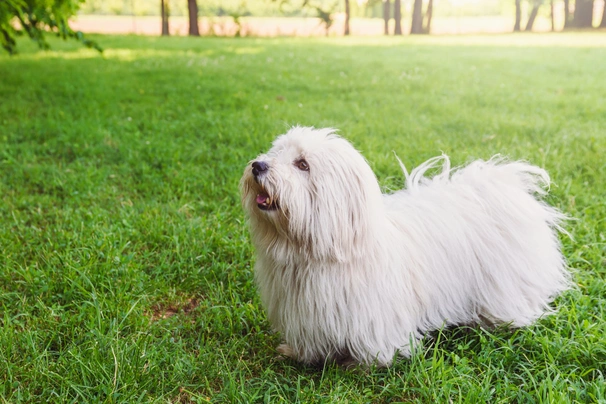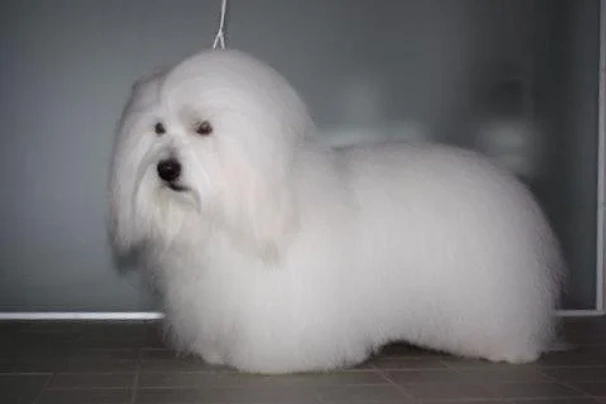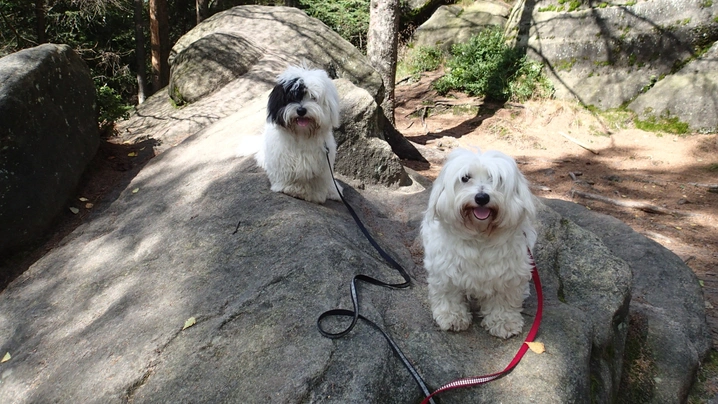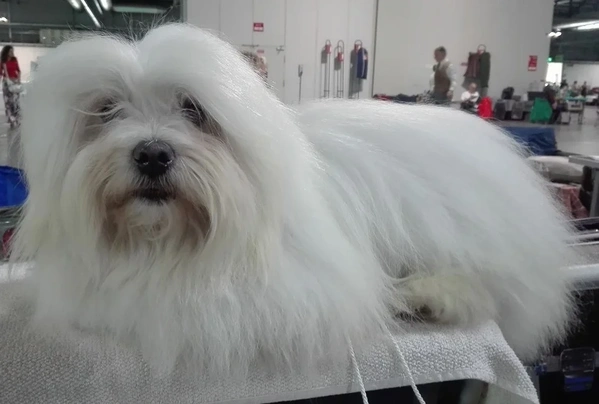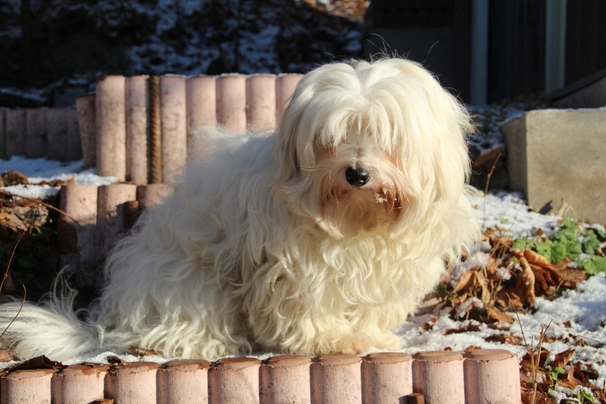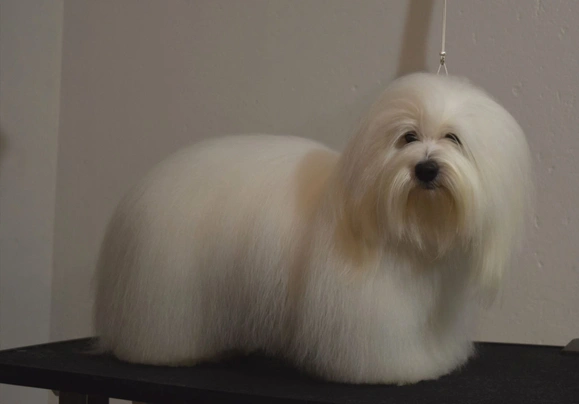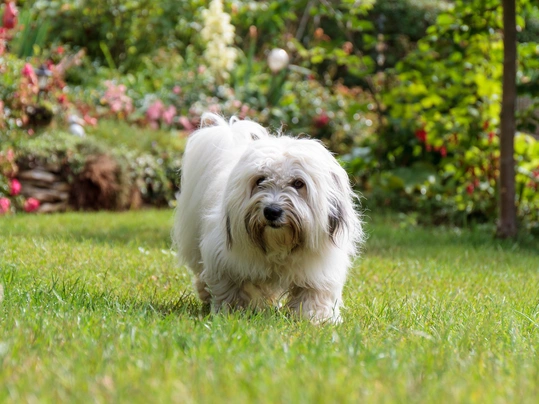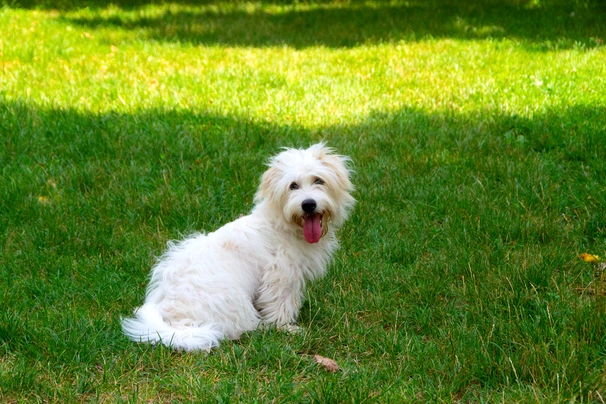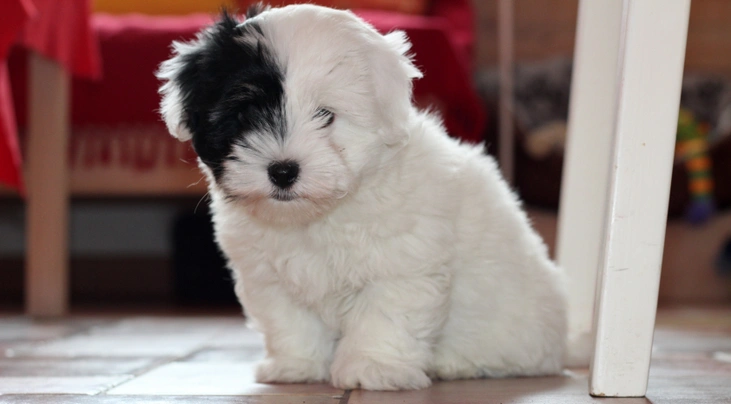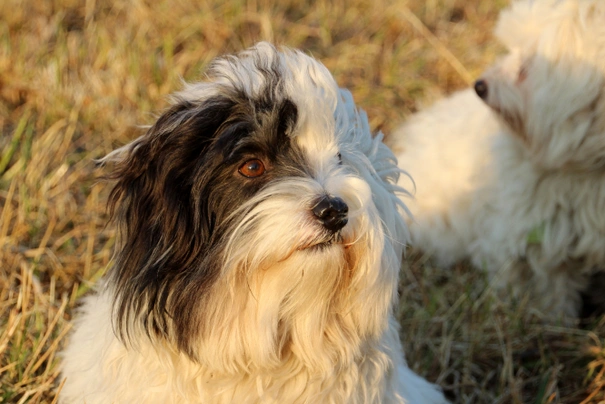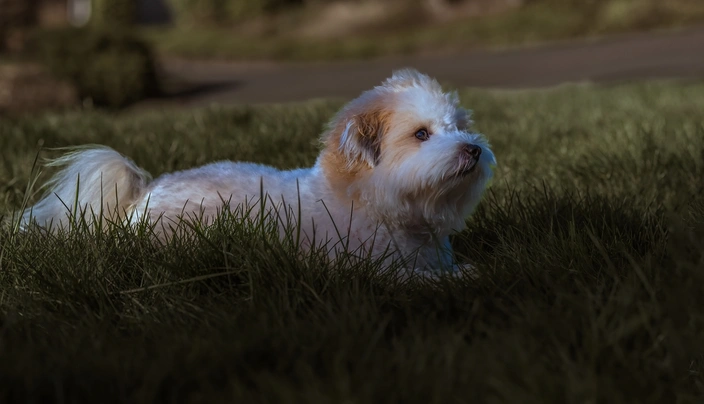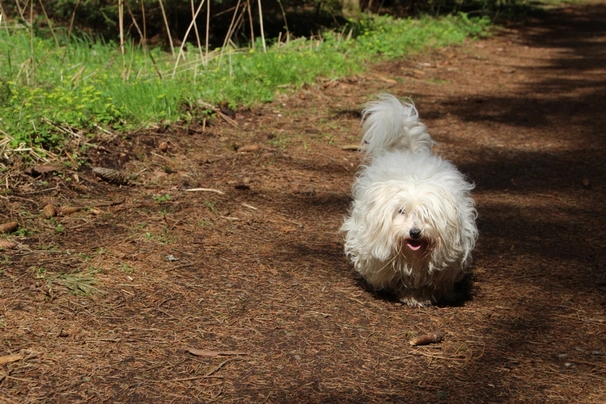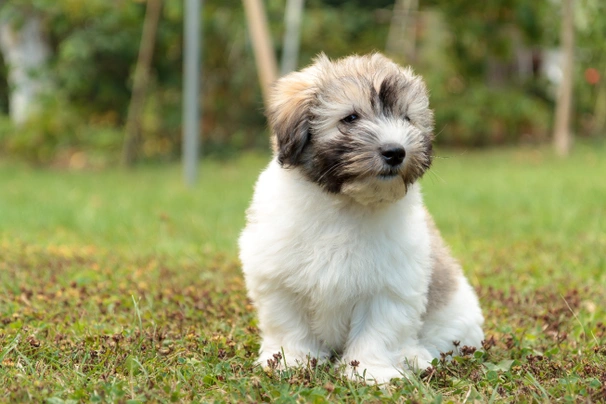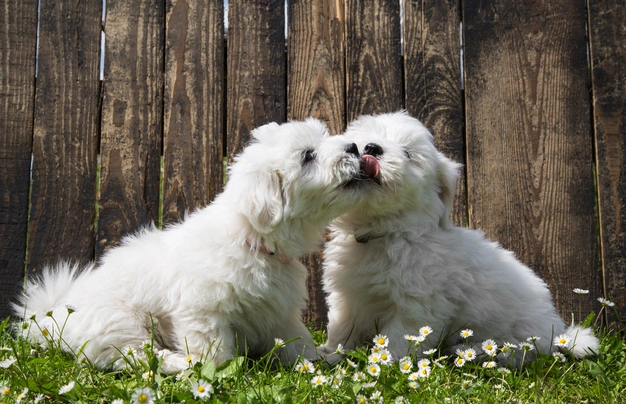Coton De Tulear
Pros
Cons
Introduction of the Coton De Tulear
The Coton de Tulear is a charming little white dog that hails from Madagascar where they are often referred to as the Royal Dogs of Madagascar. They are known to be loyal affectionate and intelligent dogs that over recent times have gained popularity both here in the UK and elsewhere in the world not only because the Coton de Tulear is such a charming dog but also because they don't shed which means they are a good choice for people who tend to suffer from allergies.
They are often referred to as "Coties" and apart from being a great choice for first time dog owners they also make wonderful family pets because they get on well with children. Coties are also lovely companions being a good choice for elderly people because they don't need to be given lots of daily physical exercise. All in all the Coton de Tulear is a charming highly adaptable small dog that is a pleasure to have around although they do like the sound of their voices a little too much.
History of the Coton De Tulear
Known as the Royal Dog of Madagascar the Coton de Tulear has been around for centuries are were often found on the island of Tula way back in the 16th century. It is thought these little white dogs were taken to the islands of Madagascar by trading ships and pirates who sailed the seas during that period of history. The Cotie’s job aboard trading ships was to control vermin but they were traded for other items and goods found in Madagascar and as such these little white dogs remained behind once the trading ships had left the islands.
Coties soon became a popular choice with the island’s noble classes and were referred to as the Royal Dogs of Madagascar for this reason. They were given the name "Coton" thanks to their soft fluffy white coats that resembles cotton being very similar to the touch. No dogs could be exported from Madagascar right up until the 1970's and then only very few select people were permitted to take a Coton de Tulear off the island with them.
They were first recognised as a breed by The Kennel Club in 1990 although as previously mentioned they have been around for centuries on the island of Tula. Today the Coton de Tulear is becoming more well known outside of their native Madagascar which includes here in the UK although anyone wishing to share a home with one of these charming little white dogs would need to register their interest with a breeder and go on a waiting list because so few well-bred Kennel Club registered pedigree puppies are bred every year.
Interesting facts about the breed
- Is the Coton de Tulear a vulnerable breed? No they are among some of the most popular dogs both as family pets and companions ranking 81 out of 238 breeds on the Pets4homes website
- Many famous people and celebrities have and do own Coties with Barbara Streisand Jane Fonda and Catherine Zeta-Jones being such some of them
- They are the "Royal dog of Madagascar"
- The Coton de Tulear was recognised as a breed by the French National Kennel Club in 1970 and they were accepted by the FCI in 1972
- They are part of the Bichon family and therefore cousins of the Bichons
- Coties were given their name after a port in Madagascar Tulear
Appearance of the Coton De Tulear
Height at the withers: Males 25 - 30 cm Females 25 - 30 cm
Average weight: Males 6 kg Females 5 kg
The Coton de Tulear is a charming little dog that resembles a Bichon Frise with their pure white fluffy coats. They have large round dark and extremely expressive eyes which adds to their endearing appearance. They have quite short forefaces and a very slightly convex skull with a slight stop and lovely black nose. Their ears are set high and are slender and pendulous being well covered with lots of long fine hair. The Cotie has a strong jaw with a perfect scissor bite where their upper teeth neatly overlap their lower ones with tight black lips.
Their necks are moderately long and slightly arched with dogs having well laid-back shoulders and nice straight front legs. Their bodies are quite compact with a good depth to the brisket and bellies are moderately tucked up. There is a slight rise over their loin and back legs are well muscled and strong. A Cotie's feet are on the small size round and tight with dogs having black pads. Tails are very well feathered and set low they taper to the tip and when dogs are at rest they carry it low although the tip is always slightly raised. When alert the Cotie carries their tail higher and level to their back.
When it comes to their coat the Coton de Tulear boasts having a pure white coat that's slightly wavy and very soft to the touch much like cotton hence the breed's name. The accepted colours for Kennel Club registration are as follows:
- White
- White with slight brown around a dog's ears
- White with grey around a dog's ears
- White with lemon around a dog's ears
- White with tan around a dog's ears
More about coloured Cotons
Prospective buyers should be aware that there is no such thing as a "coloured" Coton de Tulear although as the Kennel Club breed standard sets out Coties can have a slight amount of grey or lemon around their ears. It is also worth noting that Cotie puppies may have some colour in their coats when first born but they lose this colour as they reach maturity. In short the colour in their coats gets diluted as they grow older but if the colour remains in a Cotie's coat they are not pedigree Coton de Tulears and would have other breeds in their lineage.
Gait/movement
When a Coton de Tulear moves they do so freely with a well-defined and smart movement both in their forequarters and hindquarters. Coties are always alert and gay when they are on the move.
Faults
The Kennel Club frowns on any exaggerations or departures from the breed standard and would judge the faults on how much they affect a dog's overall health and wellbeing as well as their ability to perform.
Males should have both testicles fully descended into their scrotums and it is worth noting that a dog can be a little lighter or heavier as well as slightly taller or shorter than set out in the Kennel Club breed standard which is given as a guideline only.
Temperament of the Coton De Tulear
The Coton de Tulear is an active yet placid intelligent little dog that loves nothing more than to be kept busy playing interactive games. They form strong bonds with their families and are always ready eager and willing to please which in short means in the right environment and with the right handling they are easy to train and are quick to learn new things. However there is a downside to this which is the Coton de Tulear is quick to pick up "bad" behaviours too.
They are very “people oriented” which means they do not like to be left on their own and as such they make great family pets and companions in households where at least one person stays at home when everyone else is out of the house which in short means these little dogs always have company in the home with them. They love being around water and are remarkably strong swimmers which means care must be taken when walking a Cotie anywhere near any sort of dangerous watercourse just in case they decide to jump in.
The Coton de Tulear is quite a sensitive little dog by nature and does not like being in a noisy environment. They also tend to be a little wary and aloof around people they don't know but rarely would one of these little dogs show any sort of aggressive behaviour towards a stranger preferring to keep their distance and bark until they get to know someone. They are a great choice for first time owners although anyone wishing to share a home with one of these charming little white dogs needs to understand they are high maintenance when it comes to keeping their coats tidy and in good condition.
Are they a good choice for first time owners?
Coties are the perfect choice for first time dog owners because they are so amenable and people-oriented loving nothing more than to please and to entertain their families. They are particularly good with young children and older people too although playtime can get a bit boisterous at times.
What about prey drive?
Coties are very social by nature and therefore do not boast having a high prey drive but this is not to say that they would not happily chase the cat from next door if ever they got the chance to just for the fun of it.
What about playfulness?
Coties have a very playful side to their natures and love to entertain and be entertained. They are known to be a little mischievous and quite naughty when the mood takes them and being so clever a Cotie quickly learns how to open a cupboard door to get at any treats that might be in there. They also quickly learn what pleases an owner and can be real clowns at times especially if they know a treat is in store.
What about adaptability?
The Coton de Tulear is a highly adaptable small dog and providing they are given enough daily physical exercise combined with as much mental stimulation to prevent boredom from setting in they are just as happy living in an apartment in town as they are living in a house in the country.
What about separation anxiety?
Coties form strong ties with their families and dogs are never happy when they find themselves left on their own for long periods of time. As such they are better suited to people who either work from home or in households where one person stays at home when everyone else is out so they are never alone for any length of time which could see a dog suffering from separation anxiety. This can lead to them being destructive around the home which is a dog's way of relieving any stress they are feeling and a way to keep themselves entertained.
What about excessive barking?
Coties like the sound of their own voices a little too much which is something that needs to be gently nipped in the bud when a dog is still young being careful not to frighten them. With this said some dogs will always bark for the sake of it or when they are left on their own for too long because it is their way of getting attention and showing how unhappy they are at the situation.
Do Coton de Tulears like water?
Some Coties like swimming and will take to the water whenever they can more especially when the weather is hot. However if anyone who owns a dog that does not like water should never force them to go in because it would just end up scaring them. With this said care should always be taken when walking a Cotie off the lead anywhere near more dangerous watercourses just in case a dog decides to leap in and then needs rescuing because they can't get out on their own.
Are Coton de Tulears good watchdogs?
Coties are good watchdogs because they like to bark and any excuse is good enough for them to alert an owner when strangers are about or when something they don't like is going on in their environment. With this said because Coties are friendly by nature they would never do so aggressively preferring to keep their distance and bark.
Intelligence / Trainability of the Coton De Tulear
The Coton de Tulear is an intelligent little dog and one that is always willing and eager to please an owner. As such in the right hands they are very quick to learn new things. However because they are a little sensitive by nature they do not respond well to any sort of harsh correction or heavy-handed training methods which could just result in them becoming shy and retiring. They do answer well to positive reinforcement and more especially when their training is consistent and always fair so these little dogs understand what is expected of them.
They adore playing interactive games which is a great way of teaching a dog to do new tricks especially when they are still young. Playtime can involve training which is an important part of a puppy’s initial education and something that Coties thoroughly enjoy.
Coton de Tulear puppies are very cute and it is all too easy to spoil them when they first arrive in the home. However owners should start out as they mean to go on which means setting out boundaries and rules for a newly arrived puppy. All dogs like to know what an owner expects of them and it helps establish their place in the pack. As such puppies should be taught the following commands as soon as possible:
- Come
- Sit
- Stay
- Quiet
- Leave it
- Down
- Bed
Children and other
The Coton de Tulear is known to be very good around children of all ages and enjoys playing interactive games with them which is just one of the reasons why they make such good family pets. With this said it's always best to keep an eye on children when they are around dogs to make sure things stay calm and that nobody gets scared or hurt albeit by accident.
These little dogs generally get on well with other dogs too especially if they have been well socialised from a young enough age. They are known to be good around small pets and animals which includes cats which is unusual for such a small dog. However a Coton de Tulear may decide to chase off a neighbour's cat if the mood takes them just for the fun of it.
Health of the Coton De Tulear
The average life expectancy of a Coton de Tulear is between 14 and 16 years when properly cared for and fed an appropriate good quality diet to suit their ages.
Like so many other breeds the Cotie is known to suffer from a few hereditary health issues which are worth knowing about if you are planning share your home with one of these active and good-looking dogs. The conditions that seem to affect the breed the most include the following:
- Alabama Rot
- Canine multi-focal retinopathy (CMR) - DNA test available
- Bandera´s neonatal ataxia - DNA test available
- Primary Hyperoxaluria type 1 (PH 1) - DNA test available
- Von Willebrand's disease (VMD - Type 1) - test available
- Cataracts - annual screening available
- Progressive retinal atrophy (PRA) - annual screening available
- Luxating patella - dogs can be screened
More about Canine multifocal retinopathy (CMR)
One of the hereditary conditions that can affect a Coton de Tulear is an eye disorder known as canine multifocal retinopathy or CMR. Dogs typically show signs of there being something wrong before they are 4 months old when lesions start to develop on their retinas which are a rose/grey colour. The lesions can be varying in size and shape and they usually affect both eyes. As the condition progresses dogs typically lose their sight when they are older.
The good news is that a Cotie can be DNA tested for the condition by way of a blood or saliva sample. Puppies need to have inherited 2 defective genes from each parent to develop the condition.
More about BNAt - Bandera´s neonatal ataxia
Bandera's neonatal ataxia is a condition that is also known as Bandera's syndrome or aseneonatal ataxia and it is a neurological disorder that affects a dog's coordination and movement. The first signs of there being wrong are typically evident very soon after a puppy is born. They nurse well and grow normally but they have trouble standing and walking with their gait being ungainly and uncoordinated which has led to them being described as "swimmers". Other signs of there being something wrong often include a puppy nodding their head and jerky eye movements.
Coties can be DNA tested for the condition by taking a blood sample or through a saliva swab and puppies need to have inherited 2 of the defective genes one from each parent to inherit the condition.
More about PH1 - Primary Hyperoxaluria type 1
Coties can develop a rare autosomal recessive disorder known as Primary Hyperoxaluria Type 1 (PH1) which is a condition that negatively impacts a dog's kidney function which can lead to total failure. With this said crystals can also accumulate in other parts of a dog's body which includes tissue bones cartilage joints muscles and retinas. The signs of there being something wrong include a lack of appetite weight loss blood in urine excessive thirst and urination vomiting and abdominal pain.
Sadly the condition is incurable and dogs typically die of kidney failure when they are still quite young. The good news is there is a DNA test available and all Coties should be tested before being used for breeding purposes. A dog must inherit 2 defective genes from each parent to develop the condition.
More about VMD - Type 1 - Von Willebrand's disease
The Coton de Tulear is known to suffer from an inherited blood disorder called Von Willebrand's disease which causes excessive bleeding because essential clotting agents are missing in their blood. Some of the signs of there being something wrong include dog's having blood in their stools and urine but they could also suffer from lots of nosebleeds for no apparent reason and their gums might often bleed too.
The condition is incurable but the good news is that it can be carefully managed if the problem is not deemed severe. However if a dog's condition is more severe it is often kinder to put a dog to sleep rather than let them suffer unnecessarily. Coties can be DNA tested by a simple saliva sample or through a blood test and dogs need to inherit 2 copies of the defective gene namely one from each parent.
More about PRA & Cataracts
Coties are known to suffer from inherited eye disorders which includes Generalised Progressive Retinal Atrophy or GPRA. Sadly it is a condition that leads to dogs losing their eyesight. The first symptoms of the condition typically see a dog seeming a little lost in their own environment. Their pupils remain dilated and the lens of a dog's eye turn opaque and cloudy which leads to cataracts forming. Unfortunately there are no DNA tests available for Coties but all dogs should be screened to see if they are suffering any early signs of suffering from the condition through the British Veterinary Association (BVA).
If the condition goes untreated the cataract could slip out of place so that it floats around in a dog's eye which can then lead to it blocking an eye so that it does not drain correctly. The result is that a dog can then develop glaucoma which can in turn lead to total blindness. Coties can be tested for cataracts through annual screening the BVA.
More about Luxating patella
Coties are prone to suffering from luxating patella which is a disorder that affects a dog's kneecaps. Signs of there being a problem usually occur when a dog is anything from 4 to 6 months old but in some cases it can be slightly later when dogs are 12 months old. In most instances the condition is congenital more especially in miniature and toy breeds. However it can also be caused by trauma over-exercising young dogs or obesity which is why it is so important to ensure a Cotie never carries too much weight.
A vet would diagnose the condition and then recommend a treatment which could include surgically correcting the problem. If left untreated luxating patellar would progressively get worse. Dogs typically respond well to the surgery and go on to lead normal full lives. It is worth noting however there are 4 grades of the condition and therefore treatment and recovery depends on the severity of a dog's condition. For the moment there is no DNA test available to establish if Patellar luxation is genetically inherited but Coties should be screened when they are 1-year old.
What about vaccinations?
Coton de Tulear puppies would have been given their initial vaccinations before being sold but it is up to their new owners to make sure they have their follow-up shots in a timely manner with the vaccination schedule for puppies being as follows:
10 -12 weeks old bearing in mind that a puppy would not have full protection straight away but would be fully protected 2 weeks after they have had their second vaccination
There has been a lot of discussion about the need for dogs to have boosters. As such it's best to talk to a vet before making a final decision on whether a dog should continue to have annual vaccinations which are known as boosters.
What about spaying and neutering?
A lot of vets these days recommend waiting until dogs are slightly older before spaying and neutering them which means they are more mature before undergoing the procedures. As such they advise neutering males and spaying females when they are between the ages of 6 to 9 months old and sometimes even when a dog is 12 months old.
Other vets recommend spaying and neutering dogs when they are 6 months old but never any earlier unless for medical reasons. With this said many breeds are different and it is always advisable to discuss things with a vet and then follow their advice on when a dog should be spayed or neutered.
What about obesity problems?
Some Coties gain weight after they have been spayed or neutered and it's important to keep an eye on a dog's waistline just in case they do. If a dog starts to put on weight it's important to adjust their daily calorie intake and to up the amount of exercise they are given. Older dogs too are more prone to gaining weight and again it's essential they be fed and exercised accordingly because obesity can shorten a dog's life by several years. The reason being that it puts a lot of extra strain on a dog's internal organs including the heart which could prove fatal.
What about allergies?
Some Coties are prone to suffering from allergies and it's important for a dog to see a vet sooner rather than later if one flares up. Allergies can be notoriously hard to clear up and finding the triggers can be challenging. With this said a vet would be able to make a dog with an allergy more comfortable while they try to find out the triggers which could include the following:
- Certain dog foods that contain high levels of grain and cereal
- Airborne pollens
- Dust mites
- Environment
- Flea and tick bites
- Chemicals found in everyday household cleaning products
Participating in health schemes
All responsible Coton de Tulear breeders would ensure that their stud dogs are tested for known hereditary and congenital health issues known to affect the breed by using the following schemes:
- Patellar luxation - Coties should be screened when they are 1-year old
- Cataracts - annual screening through the BVA
- Von Willebrand's disease - DNA test available
- Hyperoxaluria Type 1 (PH1) - DNA test available
- Bandera´s neonatal ataxia - DNA test available
What about breed specific breeding restrictions?
Apart from the standard breeding restrictions set out for all Kennel Club registered breeds there are no other breed specific breeding restrictions for the Coton de Tulear.
What about Assured Breeder Requirements?
Currently there are no Kennel Club Assured Breeder requirements for the Coton de Tulear but prospective owners should always ask breeders about any congenital and hereditary health issues known to affect the breed and if their stud dogs have been tested.
Caring for the Coton De Tulear
As with any other breed Coties need to be groomed on a regular basis to make sure their coats and skin are kept in top condition. They also need to be given regular daily exercise to ensure they remain fit and healthy. On top of this dogs need to be fed good quality food that meets all their nutritional needs throughout their lives.
Caring for a Coton de Tulear puppy
Coton de Tulear puppies are boisterous and full of life which means it's essential for homes and gardens to be puppy-proofed well in advance of their arrival. A responsible breeder would have well socialised their puppies which always leads to more outgoing confident and friendly dogs right from the word go. With this said any puppy is going to feel vulnerable when they leave their mother and littermates which must be taken into account. The longer a puppy can remain with their mother the better although it should never be for too long either.
It's best to pick a puppy up when people are going to be around for the first week or so which is the time needed for a puppy to settle in. Puppy-proofing the home and garden means putting away any tools and other implements that a boisterous puppy might injure themselves on. Electric wires and cables must be put out of their reach because puppies love chewing on things. Toxic plants should be removed from flowerbeds and the home too.
Puppies need to sleep a lot to grow and develop as they should which means setting up a quiet area that's not too out of the way means they can retreat to it when they want to nap and it's important not to disturb them when they are sleeping. It's also a good idea to keep "playtime" nice and calm inside the house and to have a more active "playtime" outside in the garden which means puppies quickly learn to be less boisterous when they are inside.
The documentation a breeder provides for a puppy must have all the details of their worming date and the product used as well as the information relating to their microchip. It is essential for puppies to be wormed again keeping to a schedule which is as follows:
- Puppies should be wormed at 6 months old
- They need to be wormed again when they are 8 months old
- Puppies should be wormed when they are 10 months old
- They need to be wormed when they are 12 months old
Things you'll need for your puppy
There are certain items that new owners need to already have in the home prior to bringing a new puppy home. It's often a good idea to restrict how much space a puppy plays in more especially when you can't keep an eye on what they get up to bearing in mind that puppies are often quite boisterous which means investing in puppy gates or a large enough playpen that allows a Cotie puppy the room to express themselves while keeping them safe too. The items needed are therefore as follows:
- Good quality puppy or baby gates to fit on doors
- A good well-made playpen that's large enough for a puppy to play in so they can really express themselves as puppies like to do
- Lots of well-made toys which must include good quality chews suitable for puppies to gnaw on bearing in mind that a puppy will start teething anything from when they are 3 to 8 months old
- Good quality feed and water bowls which ideally should be ceramic rather than plastic or metal
- A grooming glove
- A slicker brush or soft bristle brush
- Dog specific toothpaste and a toothbrush
- Scissors with rounded ends
- Nail clippers
- Puppy shampoo and conditioner which must be specifically formulated for use on dogs
- A well-made dog collar or harness
- A couple of strong dog leads
- A well-made dog bed that's not too small or too big
- A well-made dog crate for use in the car and in the home that's large enough for a puppy to move around in
- Baby blankets to put in your puppy's crate and in their beds for when they want to nap or go to sleep at night
Keeping the noise down
All puppies are sensitive to noise including Cotie puppies. It's important to keep the noise levels down when a new puppy arrives in the home. TVs and music should not be played too loud which could end up stressing a small puppy out.
Keeping vet appointments
As previously mentioned Cotie puppies would have been given their first vaccinations by the breeders but they must have their follow up shots which is up to their new owners to organise. The vaccination schedule for puppies is as follows:
10 -12 weeks old bearing in mind that a puppy would not have full protection straight away but would only be fully protected 2 weeks after they have had their second vaccination
When it comes to boosters it's best to discuss these with a vet because there is a lot of debate about whether a dog really needs them after a certain time. However if a dog ever needed to go into kennels their vaccinations would need to be
What about older Coton de Tulear when they reach their senior years?
Older Coties need lots of special care because as they reach their golden years they are more at risk of developing certain health concerns. Physically a dog's muzzle may start to go grey but there will be other noticeable changes too which includes the following:
- Coats become coarser
- A loss of muscle tone
- Coties can either become overweight or underweight
- They have reduced strength and stamina
- Older dogs have difficulty regulating their body temperature
- They often develop arthritis
- Immune systems do not work as efficiently as they once did which means dogs are more susceptible to infections
- Older dogs change mentally too which means their response time tends to be slower as such they develop the following:
- They respond less to external stimuli due to impaired vision or hearing
- They tend to be a little pickier about their food
- They have a lower pain threshold
- Become intolerant of any change
- Often an older dog can feel disorientated
Living with a Coton de Tulear in their golden years means taking on a few more responsibilities but these are easily managed and should include taking a look at their diet the amount of exercise they are given how often their dog beds need changing and keeping an eye on the condition of their teeth.
Older Coties need to be fed a good quality diet that meets their needs at this stage of their lives all the while keeping a close eye on a dog's weight. A rough feeding guide for older dogs is as follows bearing in mind they should be fed highly digestible food that does not contain any additives:
- Protein content should be anything from 14 – 21%
- Fat content should be less than 10%
- Fibre content should be less than 4%
- Calcium content should be 0.5 – 0.8%
- Phosphorous content should be 0.4 – 0.7%
- Sodium content should be 0.2 – 0.4%
Older Coties don't need to be given the same amount of daily exercise as a younger dog but they still need the right amount of physical activity to maintain muscle tone and to prevent a dog from putting on too much weight. All dogs need access to fresh clean water and this is especially true of older dogs when they reach their golden years because they are more at risk of developing kidney disorders.
Grooming of the Coton De Tulear
The Coton de Tulear is high maintenance when it comes to keeping their coats tidy and in good condition bearing in mind that some dogs can suffer from skin issues. Although they have non-shedding dogs they still need to be brushed on a regular basis to prevent any tangles and matts from forming. Ideally a daily brush is needed to keep their coats and skin in good condition. However they should be taken to be professionally groomed several times a year which makes it that much easier to keep things tidy in between visits to a grooming parlour.
Their coat is more cotton-like in texture which is why knots and tangles form more easily in a dog's coat and although they do not shed it's the dander that could trigger an allergic reaction in anyone who is sensitive to dogs which is something to bear in mind if anyone in a household suffers from any kind of allergy that’s connected to dogs.
It's also important to check a dog's ears on a regular basis and to clean them when necessary. If too much wax builds up in a dog's ears it can lead to a painful infection which can be hard to clear up. In short prevention is often easier than cure when it comes to ear infections.
Exercise of the Coton De Tulear
The Coton de Tulear is an active intelligent little dog and as such they need to be given the right amount of daily exercise and mental stimulation for them to be truly happy well-rounded and obedient dogs. Ideally they need to be given at least 30 minutes exercise a day and more if possible because they love being out and about doing something.
A shorter walk in the morning would be fine but a longer more interesting one in the afternoon is a must. These dogs also like to be able to roam around a back garden as often as possible so they can really let off steam. However the fencing must be extremely secure to keep these active little dogs in because if they find a weakness in the fence they will soon escape out and get into all sorts of trouble.
With this said Cotie puppies should not be over exercised because their joints and bones are still growing and too much pressure on them could result in causing a dog a few problems later in their lives. They should not be allowed to jump up or off furniture nor should they be allowed to run up and down the stairs for this very reason.
Feeding of the Coton De Tulear
If you get a Coton de Tulear puppy from a breeder they would give you a feeding schedule and it's important to stick to the same routine feeding the same puppy food to avoid any tummy upsets. You can change a puppy's diet but this needs to be done very gradually always making sure they don't develop any digestive upsets and if they do it's best to put them back on their original diet and to discuss things with the vet before attempting to change it again.
Older dogs are not known to be fussy or finicky eaters but this does not mean you can feed them a lower quality diet. It's best to feed a mature dog twice a day once in the morning and then again in the evening making sure it's good quality food that meets all their nutritional requirements. It's also important that dogs be given the right amount of exercise so they burn off any excess calories or they might gain too much weight which can lead to all sorts of health issues. Obesity can shorten a dog's life by several years so it's important to keep an eye on their waistline from the word go.
Feeding guide for a Coton de Tulear puppy
Puppies need to be fed a highly nutritious good quality diet for them to develop and grow as they should. As a rough guide a Coton de Tulear puppy can be fed the following amounts every day making sure their meals are evenly spread out throughout the day and it's best to feed them 3 or 4 times a day:
- 2 months old - 82g to 92g depending on puppy's build
- 3 months old - 88g to 98g depending on puppy's build
- 4 months old - 104g to 114g depending on puppy's build
- 5 months old - 105g to 115g depending on puppy's build
- 6 months old - 104g to 114g depending on puppy's build
- 7 months old - 92g to 102g depending on puppy's build
- 8 months old - 80g to 90g depending on puppy's build
- 9 months old - 69g to 79g depending on puppy's build
- 10 months old - 68g to 88g depending on puppy's build
Once a puppy is 11 months old they can be fed adult dog food.
Feeding guide for an adult Coton de Tulear
Once fully mature an adult Coton de Tulear must be fed a good quality diet to ensure their continued good health. As a rough guide an adult Coton de Tulear can be fed the following amounts every day:
- Dogs weighing 5 kg can be fed 80g to 93g depending on activity
- Dogs weighing 5.5 kg can be fed 86g to 99g depending on activity
- Dogs weighing 6 kg can be fed 92g to 106g depending on activity
Coton De Tulear price
If you are looking to buy a Coton de Tulear you would have to register your interest with breeders because there are very few puppies bred and registered with The Kennel Club every year. You would also need to pay anything upwards of £1000 for a well-bred pedigree puppy. The cost of insuring a male 3-year-old Coton de Tulear in northern England would be £21.31 a month for basic cover but for a lifetime policy this would set you back £42.75 a month (quote as of January 2018). When insurance companies calculate a pet's premium they factor in several things which includes where you live in the UK and a dog's age and whether they have been neutered or spayed amongst other things.
When it comes to food costs you need to buy the best quality food whether wet or dry to feed your dog throughout their lives making sure it suits the different stages of their lives. This would set you back between £20 - £30 a month. On top of this you would need to factor in veterinary costs if you want to share your home with a Cotie and this includes their initial vaccinations their annual boosters the cost of neutering or spaying your dog when the time is right and their yearly health checks all of which quickly adds up to over £800 a year.
As a rough guide the average cost to keep and care for a Coton de Tulear would be between £50 to £80 a month depending on the level of insurance cover you opt to buy for your dog but this does not include the initial cost of buying a healthy well-bred Kennel Club registered pedigree Coton de Tulear puppy.
Buying advice
When visiting and buying any puppy or dog there are many important things to consider and questions to ask of the breeder/seller. You can read our generic puppy/dog advice here which includes making sure you see the puppy with its mother and to verify that the dog has been wormed and microchipped.
The Coton de Tulear is a popular breed both in the UK and elsewhere in the world which means that well-bred puppies command a lot of money. As such with Coton de Tulears there is specific advice questions and protocols to follow when buying a puppy which are as follows:
- Beware of online scams and how to avoid them. You may see online and other adverts by scammers showing images of beautiful Coton de Tulearpuppies for sale at very low prices. However the sellers ask buyers for money up front before agreeing to deliver a puppy to a new home. Potential buyers should never buy a puppy unseen and should never pay a deposit or any other money online to a seller. You should always visit the pet at the sellers home to confirm they are genuine and make a note of their address.
- As previously touched upon the Coton de Tulear is one of the more popular breeds in the UK. As such there are many amateur breeders/people who breed from Cotie dam far too often so they can make a quick profit without caring for the welfare of the puppies their dam or the breed in general. Under Kennel Club rules a dam can only produce 4 litters and she must be between a certain age to do so. Anyone wishing to buy a Cotie puppy should think very carefully about who they purchase their puppy from and should always ask to see the relevant paperwork pertaining to a puppy's lineage their vaccinations and their microchipping.
- Prospective Coton de Tulear owners should be very careful when considering buying an extra small puppy because all too often they suffer from very serious health issues and no responsible breeder would purposefully breed dogs so they are too small.
- Prospective buyers should be aware that there is no such thing as a "coloured" Coton de Tulear although as the Kennel Club breed standard sets out Coties can have a slight amount of grey or lemon around their ears. It is also worth noting that Cotie puppies may have some colour in their coats when first born but they lose this colour as they reach maturity. In short the colour in their coats gets diluted as they grow older but if the colour remains in a Cotie's coat they are not pedigree Coton de Tulears and would have other breeds in their lineage.
